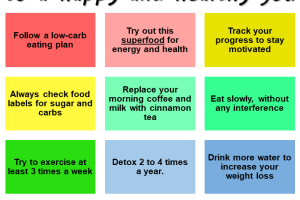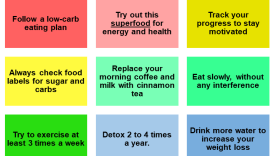The Ultimate Guide to Living a Healthier Life

Importance of Leading a Healthy Lifestyle
In today’s fast-paced world, leading a healthy lifestyle has become more essential than ever. It’s not just about fitting into your favorite jeans or looking good at the beach; it fundamentally impacts how you feel every day. A healthy lifestyle encompasses nutritious eating, regular exercise, mental well-being, and sufficient sleep, all of which are interconnected. For instance, when individuals prioritize physical activity, they often experience increased energy levels and improved mood, creating a positive ripple effect on other aspects of their lives.
- The Ultimate Guide to Living a Healthier Life
- Importance of Leading a Healthy Lifestyle
- Benefits of Prioritizing Health
- Nutrition
- Balanced Diet Overview
- Essential Nutrients for Optimal Health
- Exercise
- Different Types of Physical Activities
- How to Create an Effective Workout Routine
- Mental Health
- Strategies for Stress Management
- Importance of Mental Well-being
- Sleep
- Importance of Quality Sleep
- Tips for Improving Sleep Hygiene
- Hydration
- Benefits of Drinking an Adequate Amount of Water
- How to Stay Hydrated Throughout the Day
- Healthy Habits
- Establishing Daily Routines
- Tips for Breaking Bad Habits
- Mindfulness
- Practicing Mindful Eating
- Incorporating Mindfulness into Daily Life
Benefits of Prioritizing Health
Prioritizing health offers numerous benefits, including:
- Enhanced Longevity: Individuals who lead healthier lives often enjoy longer lifespans.
- Improved Mental Clarity: Regular exercise and a balanced diet can sharpen concentration and cognitive function.
- Increased Energy Levels: Proper nutrition and activity help sustain higher energy throughout the day.
- Better Stress Management: Engaging in healthy habits can alleviate stress and anxiety, promoting a more positive mindset.
Ultimately, investing time in health is not just a choice; it’s a commitment to a better quality of life. By recognizing the importance of a healthy lifestyle, individuals empower themselves to thrive both physically and mentally.
Nutrition
Balanced Diet Overview
A balanced diet is crucial in maintaining optimal health and well-being. It involves consuming a variety of foods in the right proportions to provide the essential nutrients your body requires to function effectively. Consider it like a well-tuned orchestra, where each food group plays its unique role. Think of it as a vibrant plate filled with colorful vegetables, whole grains, lean proteins, and healthy fats all harmonizing together. To simplify, here’s a basic guideline for a balanced diet:
- Fruits and Vegetables: Aim for half your plate to be filled with colorful fruits and vegetables.
- Proteins: Include sources like beans, fish, poultry, and nuts.
- Whole Grains: Choose whole grains like brown rice, quinoa, and whole wheat bread over refined grains.
- Dairy: Incorporate low-fat dairy options for calcium and vitamins.
Essential Nutrients for Optimal Health
Essential nutrients play pivotal roles in the body’s performance. Here are some key nutrients to focus on:
- Carbohydrates: Your main energy source; choose complex carbs like oats and whole grains.
- Proteins: Crucial for tissue repair and muscle development; think chicken, beans, and lentils.
- Fats: Healthy fats are vital; include avocados, olive oil, and nuts in your diet for heart health.
- Vitamins and Minerals: They support various bodily functions; ensure a rainbow of fruits and veggies to get a range of these nutrients.
Incorporating a balance of these nutrients not only fuels your body but also bolsters your immune system and improves overall health. Embracing these principles can lead to significant improvements in energy levels and well-being.
Exercise
Different Types of Physical Activities
Exercise is a vital component of maintaining a healthy lifestyle, and it comes in many forms. Understanding the diversity of physical activities can help individuals find something they enjoy, making it easier to stay consistent. Here are some types of physical activities to consider:
- Cardiovascular Exercises: Activities like running, cycling, swimming, and dancing boost heart health and endurance.
- Strength Training: Lifting weights, resistance band workouts, or bodyweight exercises (like push-ups) build muscle and bone density.
- Flexibility and Balance: Practices such as yoga or Pilates improve flexibility and stability, reducing the risk of injuries.
- Recreational Sports: Playing team sports like basketball or soccer can be a fun way to get a workout while socializing.
How to Create an Effective Workout Routine
Crafting an effective workout routine is essential to achieving fitness goals. Here’s a straightforward guide:
- Set Clear Goals: Define whether you want to lose weight, build muscle, or improve endurance.
- Incorporate Variety: Include a mix of cardiovascular, strength, and flexibility exercises to work different muscle groups and keep things interesting.
- Schedule Workouts: Aim for at least 150 minutes of moderate aerobic activity each week, broken down to fit your lifestyle.
- Listen to Your Body: Remember to rest when needed and don’t push through pain—recovery is key to long-term success.
By integrating diverse physical activities and a well-structured routine, individuals can enhance their overall fitness, making exercise an enjoyable and rewarding part of their day.
Mental Health
Strategies for Stress Management
Mental health is equally vital to living a balanced lifestyle, and effective stress management plays a key role in maintaining mental well-being. Managing stress can significantly improve one’s quality of life. Here are some strategies that can help:
- Mindfulness and Meditation: Practice mindfulness techniques or meditation to center your thoughts and reduce anxiety. Even a few minutes a day can make a difference.
- Physical Activity: Integrating regular exercise into your routine enhances mood and reduces stress. A brisk walk or a yoga session can provide clarity.
- Connect with Others: Don’t underestimate the power of social support. Talking to a friend or family member can offer perspective and emotional relief.
- Journaling: Writing down thoughts and feelings can help identify stress triggers and illuminate solutions.
Importance of Mental Well-being
Emphasizing mental well-being is crucial, as it directly impacts overall health and productivity. Good mental health can lead to:
- Improved Focus: Clearer thinking and enhanced concentration in daily tasks.
- Better Resilience: The ability to cope with challenges and bounce back from setbacks.
- Enhanced Relationships: Healthy connections with others, built on empathy and understanding.
Ultimately, prioritizing mental well-being fosters a happier, healthier life. It empowers individuals to experience the world with a positive perspective, leading to personal growth and fulfillment. Balancing stress management and mental health can yield profound benefits, enriching one’s journey through life.
Sleep
Importance of Quality Sleep
Sleep often gets overlooked in discussions about health, but its importance cannot be stressed enough. Quality sleep is fundamental for physical health, mental clarity, and emotional stability. Without sufficient rest, even the most dedicated nutrition and exercise regimens can falter. For instance, after a poor night’s sleep, you might notice a dip in your mood and productivity, making everyday tasks feel overwhelming. Quality sleep enhances:
- Cognitive Function: Facilitating clearer thinking and better memory retention.
- Physical Health: Supporting immune function and lowering the risk of chronic diseases.
- Mood Regulation: Encouraging emotional balance and reducing irritability.
Tips for Improving Sleep Hygiene
To enhance sleep quality, consider implementing these practical tips for better sleep hygiene:
- Establish a Sleep Schedule: Go to bed and wake up at the same time every day, even on weekends, to regulate your body clock.
- Create a Relaxing Bedtime Routine: Engage in calming activities like reading or gentle stretches to wind down.
- Limit Screen Time: Reduce exposure to screens at least an hour before bed, as blue light can interfere with melatonin production.
- Optimize Your Sleep Environment: Ensure your bedroom is dark, cool, and quiet, free from distractions.
Taking these steps can dramatically improve sleep quality, leading to increased energy, enhanced mood, and greater overall well-being. Prioritizing sleep as part of a healthy lifestyle helps pave the way for a vibrant and fulfilling life.
Hydration
Benefits of Drinking an Adequate Amount of Water
Hydration is often not given the attention it deserves, yet drinking an adequate amount of water is vital for maintaining overall health. Water plays a critical role in various bodily functions, affecting everything from digestion to temperature regulation. When you stay well-hydrated, you can experience numerous benefits, such as:
- Enhanced Physical Performance: Proper hydration can lead to improved endurance and strength during exercise.
- Better Skin Health: Adequate water intake can help keep your skin hydrated and balanced.
- Cognitive Clarity: Staying hydrated supports concentration and cognitive function, so you can think more clearly.
- Detoxification: Water helps flush out toxins and waste products, promoting kidney health.
How to Stay Hydrated Throughout the Day
Maintaining hydration can be simple with a few intentional habits. Here are some strategies to help you stay hydrated throughout the day:
- Set Reminders: Use phone alerts or apps to remind you to drink water regularly.
- Keep a Water Bottle Handy: Having a reusable water bottle within reach encourages frequent sipping, whether at work, home, or on the go.
- Infuse Your Water: Add slices of fruit or herbs to enhance flavor and make drinking water more appealing.
- Incorporate Hydrating Foods: Snack on fruits and vegetables like cucumbers, oranges, and watermelon that contribute to your hydration levels.
By making hydration a priority, individuals can significantly enhance their well-being, leading to increased energy, improved mood, and optimal health. Remember, every sip counts towards a healthier you!
Healthy Habits
Establishing Daily Routines
Creating daily routines is a cornerstone of building healthy habits. Routines not only provide structure but also help streamline decision-making, making it easier to stick to healthy choices. For example, incorporating a morning routine of stretching and a nutritious breakfast can set a positive tone for the day ahead. Here’s how to establish effective daily routines:
- Start Small: Focus on one or two habits at a time, like drinking water first thing in the morning or setting aside ten minutes for meditation.
- Be Consistent: Try to repeat your routine at the same time every day. Consistency builds familiarity, making it easier to stick with it.
- Track Your Progress: Consider keeping a journal or using a habit-tracking app to monitor your success and stay motivated.
Tips for Breaking Bad Habits
Breaking bad habits can be challenging, but it is definitely achievable. Here are some helpful strategies to facilitate the process:
- Identify Triggers: Recognize situations or emotions that lead to the habit and work on avoiding or altering those triggers.
- Replace with Positive Alternatives: Find healthier substitutions for harmful habits, such as swapping junk food for fruits or going for a walk instead of binge-watching TV.
- Set Achievable Goals: Focus on progress rather than perfection. Aim to cut down a bad habit gradually rather than quitting cold turkey.
By establishing positive daily routines and actively working to break detrimental habits, individuals can foster a healthier lifestyle that leads to greater overall well-being and fulfillment. Remember, every small change contributes to big results!
Mindfulness
Practicing Mindful Eating
Mindfulness is a powerful tool that can transform everyday activities, including how we approach our meals. Practicing mindful eating is about being fully present during meals, tuning into the experience of eating, and appreciating each bite. This practice can lead to healthier eating habits and greater satisfaction with food. Here are some strategies for practicing mindful eating:
- Slow Down: Take your time with each bite. Chew thoroughly and savor the flavors instead of rushing through your meal.
- Eliminate Distractions: Set aside your phone, TV, or computer during meals. Focus solely on the food in front of you.
- Tune into your Body: Pay attention to hunger and fullness cues. Eat when you’re hungry and stop when you’re satisfied.
Incorporating Mindfulness into Daily Life
Beyond eating, mindfulness can be infused into various aspects of daily life. To incorporate mindfulness effectively:
- Practice Gratitude: Take a moment each day to reflect on what you’re thankful for, which fosters a positive mindset.
- Breathe Deeply: Whenever you feel overwhelmed, pause and take a few deep breaths, grounding yourself in the present moment.
- Mindful Walking: While walking, focus on each step, the feeling of the ground beneath you, and your surroundings.
By embracing mindfulness in everyday routines, individuals can enhance their awareness, reduce stress, and cultivate a more balanced and fulfilling life. Each mindful moment contributes to overall well-being and happiness!




